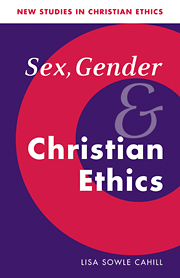Book contents
- Frontmatter
- Contents
- General editor's preface
- Acknowledgments
- 1 Sex, gender, and the problem of moral argument
- 2 Feminism and foundations
- 3 Particular experiences, shared goods
- 4 “The body” – in context
- An interlude and a proposal
- 5 Sex, gender, and early Christianity
- 6 Sex, marriage, and family in Christian tradition
- 7 The new birth technologies and public moral argument
- Concluding reflections
- Notes
- Index
- New Studies in Christian Ethics
General editor's preface
Published online by Cambridge University Press: 05 June 2012
- Frontmatter
- Contents
- General editor's preface
- Acknowledgments
- 1 Sex, gender, and the problem of moral argument
- 2 Feminism and foundations
- 3 Particular experiences, shared goods
- 4 “The body” – in context
- An interlude and a proposal
- 5 Sex, gender, and early Christianity
- 6 Sex, marriage, and family in Christian tradition
- 7 The new birth technologies and public moral argument
- Concluding reflections
- Notes
- Index
- New Studies in Christian Ethics
Summary
This is the ninth book in the series New Studies in Christian Ethics. It faces some of the most difficult areas within the discipline – those concerned with sex and gender in modern society.
The difficulties are twofold. The first is caused by the fact that post-industrial societies tend to acquire dragons but lose boundaries. The modern dragons of sex and gender have increasingly taken the form of patriarchy, sexism, homophobia, and hypocrisy. All of these are to be attacked in secular society. But the sexual and gender boundaries of post-industrial societies are harder to identify. Personal autonomy and mutual consent are almost the only criteria now commonly accepted in governing our sexual behaviour. Even sexual equality – or perhaps more accurately gender equality – may become increasingly difficult to defend intellectually once egalitarianism in other economic and social areas is no longer presumed as self-evident.
The second difficulty is created by the churches themselves. All too readily they become the dragons of post-industrial societies, exhibiting in ample measure the patriarchy, sexism, homophobia, and even hypocrisy that these societies so despise. Far from being moral beacons in a confused world, churches all too often become identified with the most despised features of moral behaviour in many societies today. Even the sexual and gender virtues that Christians apparently profess – faithfulness, altruistic love, and oneness in Christ – seem all too fragile in practice.
- Type
- Chapter
- Information
- Sex, Gender, and Christian Ethics , pp. xi - xiiiPublisher: Cambridge University PressPrint publication year: 1996



